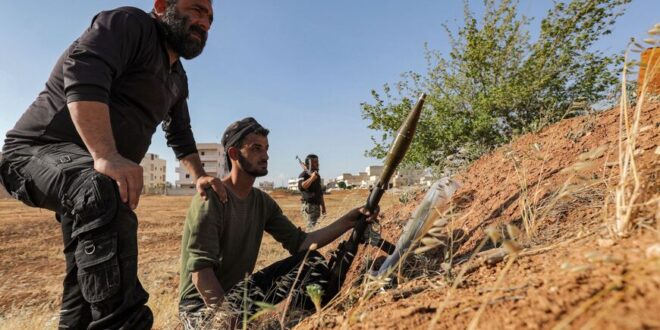Kurdish units and Iranian-affiliated factions in Syria have formed a joint operations room under Russian supervision to counter a possible Turkish military operation in northern Syria.
Several Syrian groups and battalions with different affiliations announced on May 25 the formation of a joint operations room ahead of an imminent Turkish operation in northern Syria.
The so-called North Thunderbolt joint operations room is located at a Russian base in the village of Hardatnin in the northern countryside of Aleppo.
The operations room includes the Kurdish People’s Protection Units (YPG); a battalion affiliated with the Iran-backed Fatemiyoun; a battalion affiliated with the Lebanese Shiite Hezbollah movement; Iranian-backed groups from the towns of Nubl and al-Zahraa; formations of the Syrian regime forces from the towns of Abna al-Sahel, Hayyan, Haraytan, Anadan and Masakan; and the Baath Brigades.
The military field presence of these forces is estimated at 600 soldiers, in addition to the regime forces deployed on the ground.
The operations room also includes two Russian officers, three officers from Iran’s Islamic Revolutionary Guard Corps, three Kurdistan Workers Party (PKK) leaders and two leaders from the regime forces.
The North Thunderbolt operations room aims to manage the military field in the area, in addition to coordinating and securing lines of withdrawal and supply for the YPG in the event of a Turkish attack.
In this context, a high-ranking military source from the Kurdish-led Syrian Democratic Forces (SDF) told Al-Monitor on condition of anonymity, “Iran is the one who formed the operations room by pressuring the regime and Russia and also through the Iranian leaders in the PKK’s Afrin Liberation Forces, which are present in northeastern Syria. Iran is thus seeking to protect the Shiite-majority cities of Nubl and al-Zahraa located near the lines of contact with the areas controlled by the Turkish-backed opposition, which will be at risk if the latter takes control of new areas following the Turkish operation.”
He added, “Meetings have been ongoing since the Turkish president announced preparations to launch a military operation in Syria. PKK leaders in Qandil began holding meetings with SDF leaders in order to pressure them to allow the regime and Iranian forces to enter their areas of control to deter opposition and Turkish forces. This is one of the reasons that led SDF leaders to declare that we will fight alongside the regime if Turkey attacks.”
The new field development comes in light of increasing Turkish threats to launch a military operation against an SDF-controlled area in northeastern Syria.
Turkish President Recep Tayyip Erdogan announced on May 23 Ankara’s readiness to push the SDF 30 kilometers (18 miles) from its borders and to establish a buffer zone with the aim of returning Syrian refugees in Turkey to the area in northern Syria.
The Turkish threats prompted the SDF to seek help from the regime’s forces and its allies. During the past few days, it raised the regime’s flag along with pictures of Syrian President Bashar al-Assad on its strategic positions opposite the Turkish-back opposition areas in an effort to obstruct the expected Turkish operation.
Meanwhile, Ankara still insists on carrying out the operation without specifying a date, in conjunction with maneuvers, military exercises, and reinforcements for the Turkish and opposition forces in the countryside of Aleppo.
Fayez al-Asmar, a military analyst and strategic expert and a defected colonel from the Syrian regime residing in Turkey, told Al-Monitor, “The Russians are investing the Turkish threats to pressure the SDF to hand over its areas of control in Tal Rifaat and Manbij to the regime before losing them, as happened in the Olive Branch and Peace Spring operations, through which the Turkish army took control of the cities of Afrin, Tell Abyad and Ras al-Ain. Russia aims to control these areas to pressure the opposition-controlled areas and keep the Turkish forces away from Nubl and al-Zahraa.
Abdulaziz al-Khalifa, a correspondent for the pro-opposition Baladi news agency, told Al-Monitor, “Russia aims to gather all Iranian militias and allied forces affiliated with the regime under one operations room to control their movements and use them to confront Turkey.”
An informed source in the Syrian opposition told Al-Araby al-Jadeed on May 29 that Turkey decided to postpone the military operation in Tal Rifaat and Manbij until the conclusion of the Astana meetings on June 15-17. The source said Turkey wants to obtain Russian and Iranian approval in Astana for its military operation in northern Aleppo.
Meanwhile, speaking at a joint press conference with his Turkish counterpart, Mevlut Cavusoglu, in Ankara on June 7, Russian Foreign Minister Sergey Lavrov said that Moscow attaches great importance to Turkey’s legitimate concerns in Syria and the two countries are working jointly to expel terrorists.
However, Russia’s special envoy for Syria, Alexander Lavrentiev, said on June 15 that Turkey’s possible military operation in Syria is an “unwise act, as it may cause escalation and destabilization.”
Speaking on the sidelines of the Astana meetings in Kazakhstan, Lavrentiev added that Moscow will not turn a blind eye to the new Turkish military operation in northern Syria in return for Ankara’s position on Finland and Sweden joining NATO.
Lavrentiev further called on Ankara to resolve the issue of northern Syria peacefully, pointing out that they will discuss the field situation during the Astana talks.
Anas Shawakh, a researcher at the Jusoor Center for Studies in Istanbul, told Al-Monitor, “The reason for the contradictory Russian positions on the Turkish operation in northern Syria is Moscow’s attempt to express its dissatisfaction with the US role by declaring its understanding of Turkey’s security concerns. But Russia is also rejecting the Turkish operation to score some points before the Damascus government and its supporters, as well as its allies, especially the Iranians.”
Shawakh added, “In general, Russia will benefit more if the Turkish control is stronger than the US influence in Syria. In any case, the Russian rejection will not discourage Turkey from launching the military operation.”
 Eurasia Press & News
Eurasia Press & News




